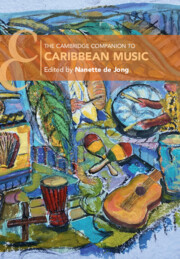Acknowledgements
The Caribbean, to borrow from Aníbal Quijano (1967), emerged against a ‘coloniality of power’ that connected the islands to an immanent logic of imperial histories and colonial difference. It is a perspective that has long framed my thinking about – and teaching of – Caribbean music. When asked to edit this book, a main objective was to build on Quijano’s argument by outlining how Caribbean music has dismantled that ‘coloniality of power’; how musicians explicitly or implicitly challenge imperial productions of knowledge and values. During the final editing of the book, the world witnessed the rise of the Black Lives Matter movement and the profound call for more accountability in preventing racial and gender inequality. In response, scholars and educators across the globe pledged to redress racist and exclusionary practices in their disciplines and classrooms, and to seek out strategies for more inclusive and critically engaged scholarship. This book, in reply, assumed renewed urgency, making its objective to critically assess Caribbean music through the concept of coloniality of power ever the timelier and more crucial.
To that end, the contributors in this book deserve enormous thanks for their commitment to this project, and for the patience it took to ensure its publication. They have provided thoughtful, innovative chapters that tackle themes of coloniality and post-coloniality through considered and inspired perspectives. Their chapters highlight some of the ways in which music-making radically reformulates difference, confirming a new paradigm for studying and understanding Caribbean music that can be extended to other world musics as well.
At Cambridge University Press, Kate Brett has provided the most generous attention to me as an author and editor, always willing to share her intellectual guidance and encouragement, which was offered with unfailing support and enthusiasm. I am also grateful to Joseph Shaw, from Cambridge University Press, for making this manuscript more readable than it would otherwise have been.
I am extremely fortunate to be surrounded by a wonderful, intellectually stimulating group of colleagues at Newcastle University. I am grateful to each of them for helping to create an academic environment that has allowed for the stimulating conversations and debates and research-led teaching that helped guide my final editing of the book.
For reading and rereading drafts of this book and sharing their insightful comments, I offer particular thanks to Isabel Nazario and Julio Nazario. From the start of my academic career, Isabel and Julio inspired me to open and diversify my approach to examining Caribbean music. Their wisdom and guidance inspired not only my continued work in the classroom but also my research, including this book project.
Special words of thanks also to my ‘coffee club’ gang of Kay Murray and Philippa Smith, and to my long-time friends Stephanie Motz, Aqualine Suliali and Ann Makela Snyder: your continuous support and encouragement throughout the editing of this book was always a welcome and needed relief. Thanks also to my students, whose many discussions on Caribbean music inside and out of class have helped me tease out the ideas now presented in this book.
Words of appreciation are also due to my PhD supervisor, Lorna McDaniel, whose support, advice, and guidance went above and beyond the regular duties of a supervisor. My first journey to the Caribbean was with Lorna, when I assisted her with research on Big Drum and Spiritual Baptists. I joined her on subsequent research adventures to Puerto Rico and Trinidad, as well as return trips to Grenada and Carriacou. I am forever thankful to Lorna for lighting my lifelong devotion to studying Caribbean music.
A final thanks goes to my family, who have helped me along the way, intellectually and emotionally, and have always seen what this book could be: Owen de Jong, Laurie Brown, Gerald de Jong, Renee Baillargeon, Drew de Jong, Janet Zielinski, Chet de Jong, Mel de Jong, Karl de Jong, Kristal de Jong, and, above all, my daughter Sara, who kept herself busy for hours upon hours, during several Covid-related lockdowns, so that this book could finally be completed.


